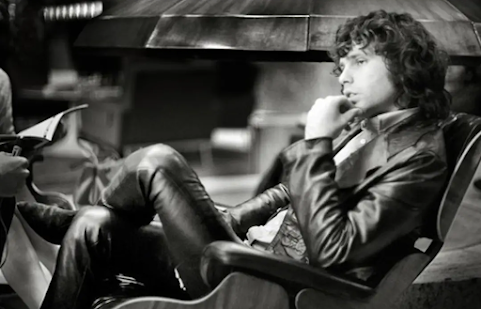"MOONLIGHT DRIVE": JIM MORRISON THE POET
Poetry was one of Jim Morrison's most significant artistic and cultural
interests. He frequently explored this art form, both within and beyond his
work with The Doors.
Indeed, he left behind numerous poems that were not intended to be set
to music.
As a poet, Morrison published several works in magazines or as
collections.
However, his role as a musician was closely intertwined with his poetic
output, as evidenced by the haunting lyrics he wrote for The Doors' songs. No
other band or artist of the time could match this feature, except, of course,
Bob Dylan.
He was a poet who broke out of the conventions that bound American
society in the 1960s, astonishing and shocking the music scene with the words
of his songs.
The lyrics that Morrison composed for The Doors are written in the
collective memory as well as in the history of modern music: sometimes cryptic
and indecipherable, sometimes direct and uncompromising.
He tackled multiple themes and aspects of human reality, always adopting
original perspectives and angles, much like a painter capable of revealing the
unexpected soul of a subject through a picture.
His poetic and literary influences ranged from Kafka and Kerouac to
19th-century poets such as William Blake and Arthur Rimbaud.
It was from these writers that Morrison drew inspiration to translate
the startling thoughts that populated his fertile imagination into evocative
and thought-provoking images.
Among the songs composed by this immense artist, we would like to highlight "Moonlight Drive" (here's the link).
Not only was it one of the first compositions conceived by the singer's
genius in the summer of 1965, but it also possesses lyrics that draw heavily on
the themes of nineteenth-century romantic poetry and literature.
These cultural references were unfortunately underestimated when the
song was released on The Doors' second album, "Strange Days", on 25
September 1967.
The lyrics of this composition include references to the pursuit of
personal freedom and breaking free from the social conventions that imprison us
and frustrate our brightest aspirations.
This is a theme that affects us all, and Morrison addresses it through a
series of vivid and highly effective metaphors.
Chief among these is the metaphor of swimming to the moon, which symbolizes
abandoning the city and the oppressive patterns of life imposed on the
individual.
Additionally, the text is rich in nature imagery. These images are
intended to inspire a broader self-awareness and a passion for life.
The influence of Romantic poetry from the 19th century is clear in both
the form and content of these lyrics, suggesting a direct connection to
Morrison's interpretations of the works of poets from that artistic and poetic
school.
Indeed, Romantic poetry adopted the same types of metaphors inspired by
natural elements, linking their meaning to the inner stirrings of the human
soul.
This magnificent song gives us the opportunity to look beyond the superficial
image that was built around Jim Morrison as a rock star.
In this way, we can penetrate beneath the surface of transgression and
discover a poet and an educated, curious and sensitive young man.
The words written by the singer for The Doors deserve more attention, as
we briefly saw with "Moonlight Drive". This will enable us to do
justice to a lyricist that was interested in all forms of art.
He was often the subject of journalistic speculation, which was always
ready to demonize any behavior that did not conform to the expectations of the 1960s
dominant culture. Anyway, he was strong and visionary enough to forge his own
path, without submitting to the pressures of the conformist majority.
By exploring the deep meanings of Morrison's lyrics alongside the rock
genre, we can enhance the already delightful and amazing listening experience
offered by The Doors' songs.
P.S.: My book "The Doors Through Strange Days"- The most comprehensive journey ever made through The Doors' second LP, is available on Amazon.com, .uk, .mx, .it, etc.
Here’s a link:




Comments
Post a Comment